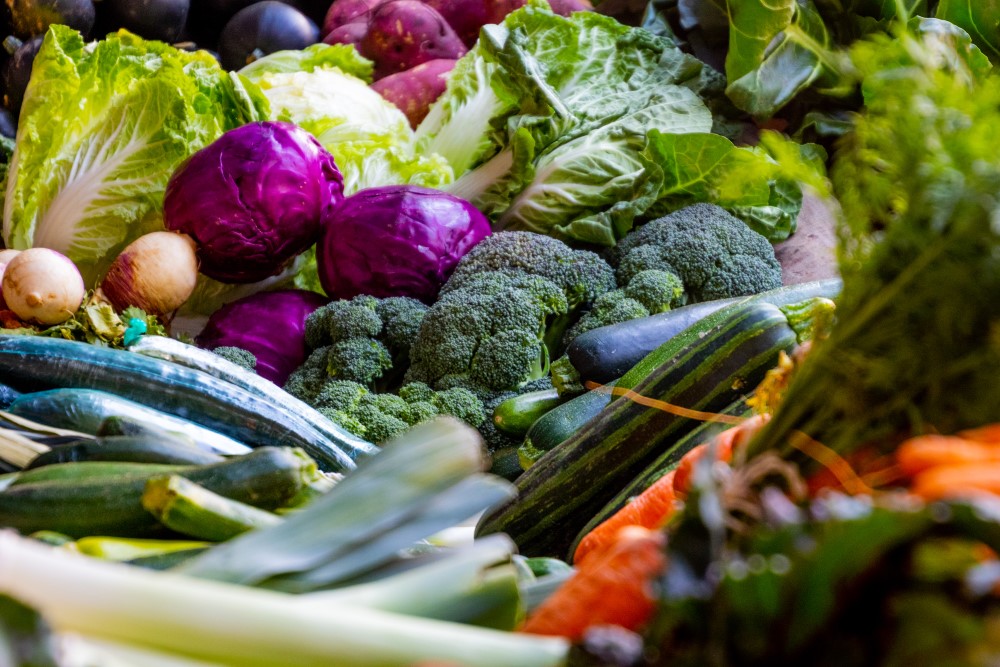Many chronic diseases such as type 2 diabetes; hypertension (high blood pressure) and heart disease; age-related cognitive decline including dementia and Alzheimer’s disease; and cancers may be thought of as inevitable part of aging.
Although statistically, the prevalence of these chronic diseases increases with age, especially after age 40, numerous clinical research and studies have shown the strong influence of diets and lifestyle in the prevention and management of these diseases.
Let’s not be part of the statistics!
In Part 5 of this article series, we present a summary of what the latest research have shown in terms of the appropriate diets for the prevention and management of some types of cancers.
The identified risk factors and contributors are also presented.
Prevalence
(Data from U.S. Cancer Statistics Working Group.1)
Cancer is the number two leading cause of death in the United States, a close second behind heart disease. One of every four deaths in the United States is due to cancer.
Lung/bronchus cancer has the highest mortality rate, while breast cancer and prostate cancer have the 2nd and 3rd mortality rate respectively.
Breast cancer ranks the highest for the prevalence of new cases of cancers, while prostate cancer and lung/bronchus cancer rank 2nd and 3rd.
Risk Factors and Contributors to Cancer
An estimated 5-10% of cancers are due to hereditary genetic mutations, while 90-95% of cancers are driven by environmental factors including diets and lifestyle.2
Diet and nutrition are considered drivers of nearly 40% of all cancers.2
There are different stages to cancer development including:
- The initial onset of cancer cell formation, i.e. transformation of normal cells to cancer cells
- The continued proliferation of cancer cells and tumor development
Initial Onset
The initial onset of cancer cell formation is thought to be driven by genetic abnormalities, which can be classified into mutation of genes and abnormalities in the expression of genes (i.e. epigenetic abnormalities).3
Genetic mutation can be hereditary or spontaneous due to environmental factors.
Risk factors associated with the initial onset of cancer cell formation include chronic inflammation caused by infections (e.g. in the case of cervical cancer and gastric cancer) and environment toxins.4
Continued Proliferation
After the initial onset, the continued proliferation of cancer cells results in tumor formation.
The continued proliferation of cancer cells is influenced by substrates that fuel or conditions that promote the growth of cancer cells, including:5–7
- Glucose
- Certain types of amino acids, e.g. methionine, glutamine
- Insulin like growth factor 1 (IGF-1), a type of growth signaling
- Impaired immune function that fails to eradicate and inhibit the growth of abnormal cancer cells
- Estrogen excess or dominance, i.e. abnormally high estrogen levels or estrogen-to-progesterone ratio, that contributes to certain types of cancers (e.g. breast cancer, endometrial cancer, ovarian cancer and prostate cancer). (See more details in Female Hormonal Health – The Fine Balance.)
Beneficial Diets and Nutrition for Cancer
Dietary Approaches Studied in Pre-clinical and Clinical Research
Dietary Patterns
The most studied dietary patterns in clinical research (based on human subjects) for chronic diseases including cancers are the traditional Mediterranean diet and vegetarian/vegan diets.8,9
The association between dietary protein and dietary fat intake and cancer risk and mortality was also studied.6
Therapeutic Dietary Interventions
Specific therapeutic dietary interventions were also studied. However, so far, most of the therapeutic dietary interventions studied were performed on animal and laboratory models (i.e. pre-clinical studies), while limited number of studies on human subjects (i.e. clinical studies) are available.8,11
The main dietary interventions studied include:
- Fasting
- Calorie restriction (CR) diets
- Low carbohydrate diets including ketogenic diet (KD)
- Phytoestrogens to mitigate estrogen excess/dominance
Fasting8,11,16
Fasting is characterized by minimal amount of or no food and caloric beverages intake for a period ranging from 12 hours to days or weeks.
Fasting can take various forms in terms of the duration and the periodicity of the fast.
- Intermittent fasting (IF) refers to short-term periodic fasting ranging from 12 or more consecutive hours, repeated one or more times per week.
- Short-term fasting refers one to a few consecutive days of fasting which may be repeated periodically.
- Long-term fasting refers to one week or more of consecutive days of fasting which may be repeated periodically.
Calorie Restriction (CR) Diets3,11,17
CR consists of reducing the calorie intake by 10-40% without malnutrition.
Ketogenic Diets (KD)11,18
KD limits the carbohydrate proportion to less than 5%, while having a high proportion of fats including saturated fats and moderate proportion of protein.
Nutritional Compounds
Various nutritional compounds have also been studied in terms of their anticancer properties.
One prominent group of compounds studied in clinical research are phytoestrogens. Phytoestrogens are plant compounds that exert estrogenic or anti-estrogenic effects in the body, depending on the target organs/tissues.
Some phytoestrogens can counter the effects of excess endogenous estrogen in the body, hence are beneficial for addressing estrogen excess/dominance related cancers. 12–15
Other nutritional compounds studied include vitamin D and many phytochemicals found in plant foods (i.e., fruits, vegetables, whole grains, spices).2
Highlights of Pre-Clinical and Clinical Research Findings2,3,6,8–24
Dietary Patterns
Beneficial dietary patterns for the prevention and management of cancers include: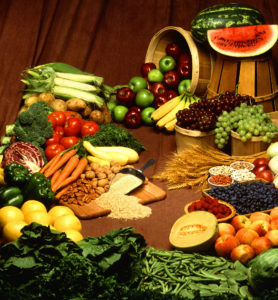
- The traditional Mediterranean diet.
- Vegetarian and vegan diets, where vegan diets outperformed vegetarian diets.
- Diets low in animal proteins, thus lower in the amino acid, methionine and results in lower IGF-1 levels in the body.
- Diets low in saturated fats.
- Diets low in refined carbohydrates.
In general, diets that are rich in whole plant-based foods including whole fruits, vegetables, whole grains and spices have been shown to be beneficial. These foods are high in fiber and rich in anticancer phytochemicals.
Therapeutic Dietary Interventions
Based on currently limited number of studies, CR, IF, and KD have shown positive results in the prevention and management of cancers.
- CR was shown to reduce metabolic rate, oxidative stress, inflammation, IGF-1, blood glucose, insulin and cancer cell blood vessel growth, thus preventing and retarding the initiation, development and progression of cancer cells.
- IF was shown to starve cancer cells from glucose for a short duration, and slow cancer cell growth.
- Short-term fasting of 2-3 days was shown to enhance the therapeutic effects of chemotherapy while reducing the harmful effects.
- KD reduces the glucose available to cancer cells while providing ketones to normal cells for energy production. KD was shown to slow cancer progression and promote remission. KD may also enhance the therapeutic effect of radio-chemotherapy.
Nutritional Compounds
Phytoestrogens
Clinical studies showed the benefit of certain phytoestrogens in reducing the risk of cancers associated with estrogen excess/dominance:
- Isoflavones found in soy: Reduce the risks of breast cancer, endometrial cancer, ovarian cancer and prostate cancer.
- Lignans found in flaxseed: Reduce the risks of breast cancer among postmenopausal women and prostate cancer.
(See more details on diet and nutrition to mitigate estrogen excess/dominance in Diet and Nutrition for Female Hormonal Health.)
Other Nutritional Compounds
Many nutritional compounds found in plant foods, i.e., phytochemicals, have been shown to have anticancer properties. However, most studies were pre-clinical, with some limited number of clinical studies.
These beneficial nutritional compounds include: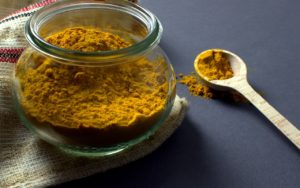
- Curcumin, the most bioactive compound in turmeric.
- Antioxidants in berries.
- Sulforaphane, found in cruciferous vegetables in particular broccoli.
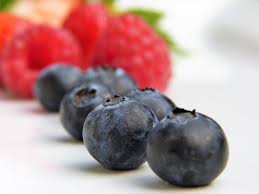
- Allicin, a bioactive compound in in garlic.
- Flavonoids such as apigenin and luteolin, found in parsley, celery, chamomile tea, etc.
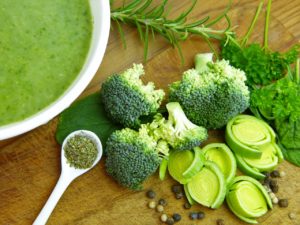
- Resveratrol, found in blueberries, red grapes, dark chocolate, etc.
- Quercetin, found in leafy vegetables, dark red and blue colored fruits, onion, caper. etc.
- Carotenoids (natural pigments present in many fruits and vegetables), in particular lycopene (found in tomatoes, watermelon, sweet red pepper, etc.) and β-carotene
 (found in carrots, sweet potatoes, dark leafy green vegetables, etc.)
(found in carrots, sweet potatoes, dark leafy green vegetables, etc.) - Vitamin E, especially tocotrienols, found in barley, rye, palm oil, rice bran oil, etc.
- DHA from omega-3 rich foods.
- Catechin, a bioactive compound in green tea.
A healthy gut flora containing the species Bifidobacterium, Bacteroides thetaiotaomicron and Bacteroides fragilis was shown to boost immunosurveillance against cancer cells. Thus, a healthy diet consisting of prebiotic and probiotic foods is important.
Vitamin D3 supplementation (1000-5000 IU/day) and/or adequate sun (UV-B) exposure to raise the blood serum concentration of calcitriol (active form of vitamin D) to 100-150 nmol/l has been shown to support the prevention and management of many types of cancers including colorectal cancer, pancreatic cancer, and estrogen-dependent cancers (breast, ovarian, endometrial and prostate cancers).
Related Articles
Female Hormonal Health – A Fine Balance
Diet and Nutrition for Female Hormonal Health
Diets and Chronic Disease (Part 1: Type 2 Diabetes)
Diets and Chronic Disease (Part 2: High Blood Pressure)
Diets and Chronic Disease (Part 3: Heart Disease)
Diets and Chronic Disease (Part 4: Alzheimer’s Disease)
References
- S. Cancer Statistics Working Group. U.S. Cancer Statistics Data Visualizations Tool, based on November 2017 submission data (1999-2015): U.S. Department of Health and Human Services, Centers for Disease Control and Prevention and National Cancer Institute; www.cdc.gov/cancer/dataviz, June 2018.
- Chen KL, Jung P, Kulkoyluoglu-Cotul E, et al. Impact of Diet and Nutrition on Cancer Hallmarks. J Cancer Prev Curr Res. 2017;7(4):240.
- Meynet O, Ricci J. Caloric restriction and cancer: molecular mechanisms and clinical implications. Trends Mol Med. 2014;20(8):419-427. doi:10.1016/j.molmed.2014.05.001
- Moss S, Blaser M. Mechanisms of Disease: inflammation and the origins of cancer. Nature Clinical Practice Oncology. 2005;2(2):90-97. doi:10.1038/ncponc0081
- Keenan M, Chi J. Alternative Fuels for Cancer Cells. The Cancer Journal. 2015;21(2):49-55. doi:10.1097/ppo.0000000000000104
- Levine M, Suarez J, Brandhorst S et al. Low Protein Intake Is Associated with a Major Reduction in IGF-1, Cancer, and Overall Mortality in the 65 and Younger but Not Older Population. Cell Metab. 2014;19(3):407-417. doi:10.1016/j.cmet.2014.02.006
- Swann J, Smyth M. Immune surveillance of tumors. Journal of Clinical Investigation. 2007;117(5):1137-1146. doi:10.1172/jci31405
- Schwingshackl L, Schwedhelm C, Galbete C, Hoffmann G. Adherence to Mediterranean Diet and Risk of Cancer: An Updated Systematic Review and Meta-Analysis. Nutrients. 2017;9(10):1063. Published 2017 Sep 26. doi:10.3390/nu9101063
- Dinu M, Abbate R, Gensini G, Casini A, Sofi F. Vegetarian, vegan diets and multiple health outcomes: A systematic review with meta-analysis of observational studies. Crit Rev Food Sci Nutr. 2016;57(17):3640-3649. doi:10.1080/10408398.2016.1138447
- Longo V, Mattson M. Fasting: Molecular Mechanisms and Clinical Applications. Cell Metab. 2014;19(2):181-192. doi:10.1016/j.cmet.2013.12.008
- Lv M, Zhu X, Wang H, Wang F, Guan W. Roles of Caloric Restriction, Ketogenic Diet and Intermittent Fasting during Initiation, Progression and Metastasis of Cancer in Animal Models: A Systematic Review and Meta-Analysis. PLoS ONE. 2014;9(12):e115147. doi:10.1371/journal.pone.0115147
- Fritz H, Seely D, Flower G et al. Soy, Red Clover, and Isoflavones and Breast Cancer: A Systematic Review. PLoS ONE. 2013;8(11):e81968. doi:10.1371/journal.pone.0081968
- Myung S, Ju W, Choi H, Kim S. Soy intake and risk of endocrine-related gynaecological cancer: a meta-analysis. BJOG: An International Journal of Obstetrics & Gynaecology. 2009;116(13):1697-1705. doi:10.1111/j.1471-0528.2009.02322.x
- Zhang G, Chen J, Liu Q, Zhang Y, Zeng H, Zhao Y. Soy Intake Is Associated With Lower Endometrial Cancer Risk: A Systematic Review and Meta-Analysis of Observational Studies. Medicine (Baltimore). 2015;94(50):e2281. doi:10.1097/md.0000000000002281
- Calado A, Neves P, Santos T, Ravasco P. The Effect of Flaxseed in Breast Cancer: A Literature Review. Front Nutr. 2018;5. doi:10.3389/fnut.2018.00004
- Brandhorst S, Choi I, Wei M et al. A Periodic Diet that Mimics Fasting Promotes Multi-System Regeneration, Enhanced Cognitive Performance, and Healthspan. Cell Metab. 2015;22(1):86-99. doi:10.1016/j.cmet.2015.05.012
- Martín-Montalvo A, Villalba J, Navas P, de Cabo R. NRF2, cancer and calorie restriction. Oncogene. 2010;30(5):505-520. doi:10.1038/onc.2010.492
- Jansen N, Walach H. The development of tumours under a ketogenic diet in association with the novel tumour marker TKTL1: A case series in general practice. Oncol Lett. 2015;11(1):584-592. doi:10.3892/ol.2015.3923
- Lee C, Raffaghello L, Brandhorst S et al. Fasting Cycles Retard Growth of Tumors and Sensitize a Range of Cancer Cell Types to Chemotherapy. Sci Transl Med. 2012;4(124):124ra27-124ra27. doi:10.1126/scitranslmed.3003293
- de Groot S, Vreeswijk M, Welters M et al. The effects of short-term fasting on tolerance to (neo) adjuvant chemotherapy in HER2-negative breast cancer patients: a randomized pilot study. BMC Cancer. 2015;15(1). doi:10.1186/s12885-015-1663-5
- Allen B, Bhatia S, Anderson C et al. Ketogenic diets as an adjuvant cancer therapy: History and potential mechanism. Redox Biol. 2014;2:963-970. doi:10.1016/j.redox.2014.08.002
- Cavuoto P, Fenech M. A review of methionine dependency and the role of methionine restriction in cancer growth control and life-span extension. Cancer Treat Rev. 2012;38(6):726-736. doi:10.1016/j.ctrv.2012.01.004
- Grant W. A Review of the Evidence Supporting the Vitamin D-Cancer Prevention Hypothesis in 2017. Anticancer Res. 2017;38(2). doi:10.21873/anticanres.12331
- Pendleton J, Tan W, Anai S et al. Phase II trial of isoflavone in prostate-specific antigen recurrent prostate cancer after previous local therapy. BMC Cancer. 2008;8(1). doi:10.1186/1471-2407-8-132

